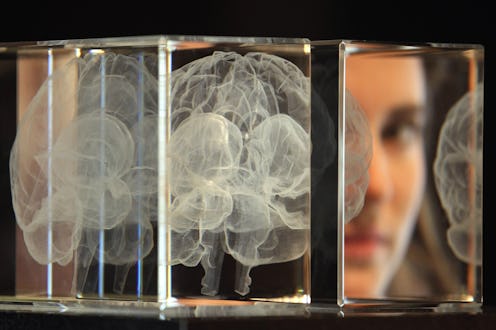News
Nobel Prize Winners Discovered Your Brain's GPS
Did you know your brain came equipped with its own GPS system? That's what three scientists have uncovered — a discovery that just led to the coveted Nobel Prize. Scientists John O’Keefe, Britt-May Moser and Edvard Moser were awarded the Nobel Prize in Medicine for their brain discovery, which has helped further research of Alzheimer's disease and other cognitive impairments. O'Keefe and Britt-May and Edvard Moser, a husband and wife team, will share the prestigious prize.
According to the Nobel committee, O'Keefe first discovered the integral part to the brain's "inner GPS" system in 1971when he was experimenting with nerve cells in rats. O'Keefe, who's a dual U.S.-British citizen, found a type of nerve cell in the hippocampus, located in the temporal lobe of the brain, that was activated whenever a rat was placed in a room. He called the cells "place cells," and determined that they help rats create their very own map of a room. O'Keefe concluded that these maps were not just triggered by visual aspects, but also built by storing information.
Decades later, Britt-May and Edvard Moser, professors of neuroscience at the Norwegian University of Science and Technology, uncovered another type of nerve cell, which they called "grid cells." These cells further helped rats — and humans — determine their position in a more precise manner. According to the Moser's research, the place and grid cells work together to help animals and humans navigate their surroundings.
In their statement, the Nobel committee said:
The discoveries of John O ́Keefe, May‐Britt Moser and Edvard Moser have solved a problem that has occupied philosophers and scientists for centuries – how does the brain create a map of the space surrounding us and how can we navigate our way through a complex environment? ... The discovery of the brain’s positioning system represents a paradigm shift in our understanding of how ensembles of specialized cells work together to execute higher cognitive functions. It has opened new avenues for understanding other cognitive processes, such as memory, thinking and planning.
According to the committee, the combined research of O'Keefe and May-Britt and Edvard Moser has helped facilitate advancements in treating and preventing both dementia and Alzheimer's disease, which scientists say affects the hippocampus early on. This is why Alzheimer's patients tend to lose their way very easily, and are often disoriented as the disease progresses.
For O'Keefe especially, receiving the Nobel Prize is validation for his life's work, which scientists say went unrecognized in the 1970s. Professor John Stein at the University of Oxford told BBC News on Monday:
I remember how great was the scoffing in the early 1970s when John first described 'place cells.' "Now, like so many ideas that were at first highly controversial, people say 'Well that's obvious!'"
Images: Getty Images (2)
